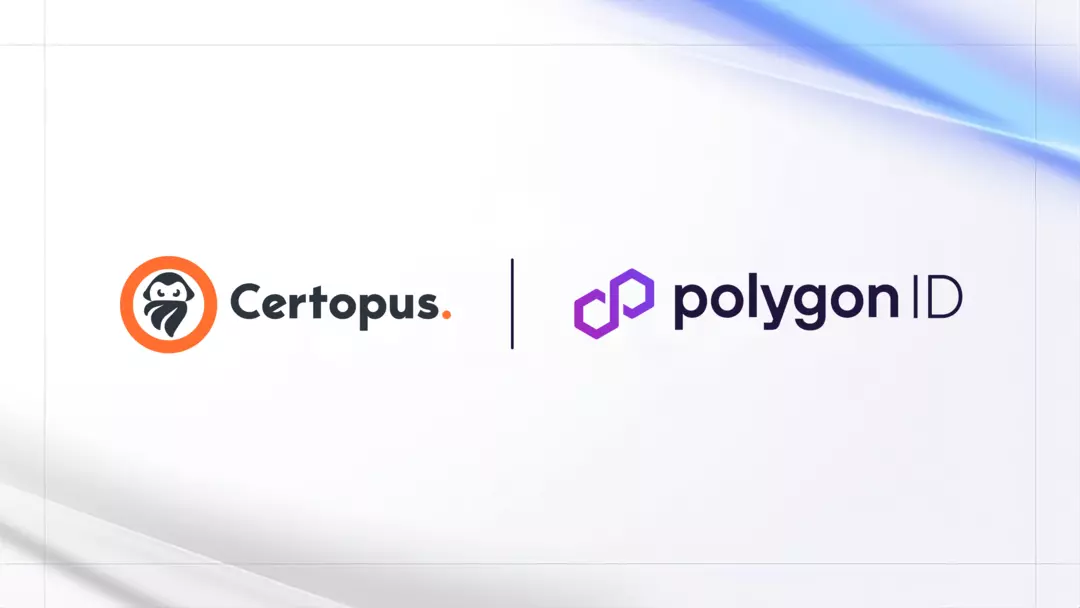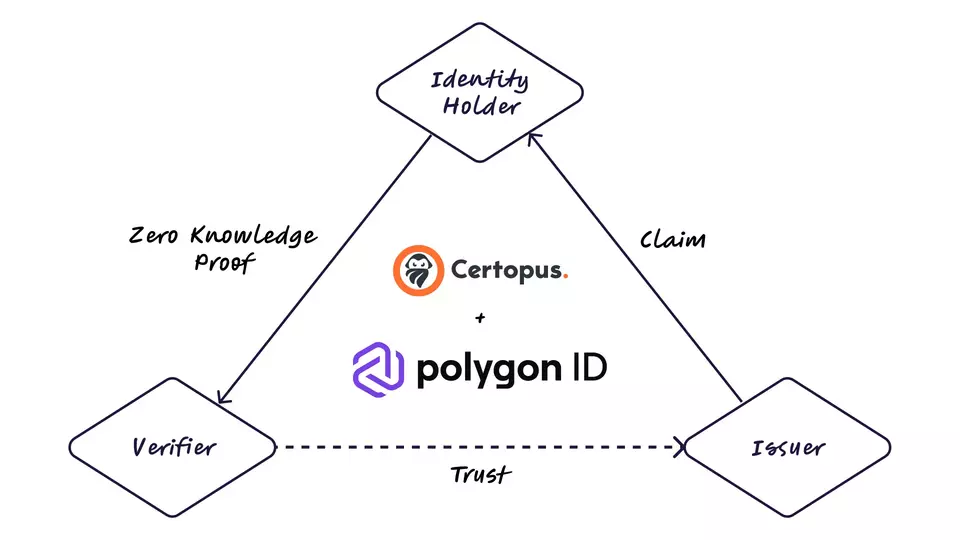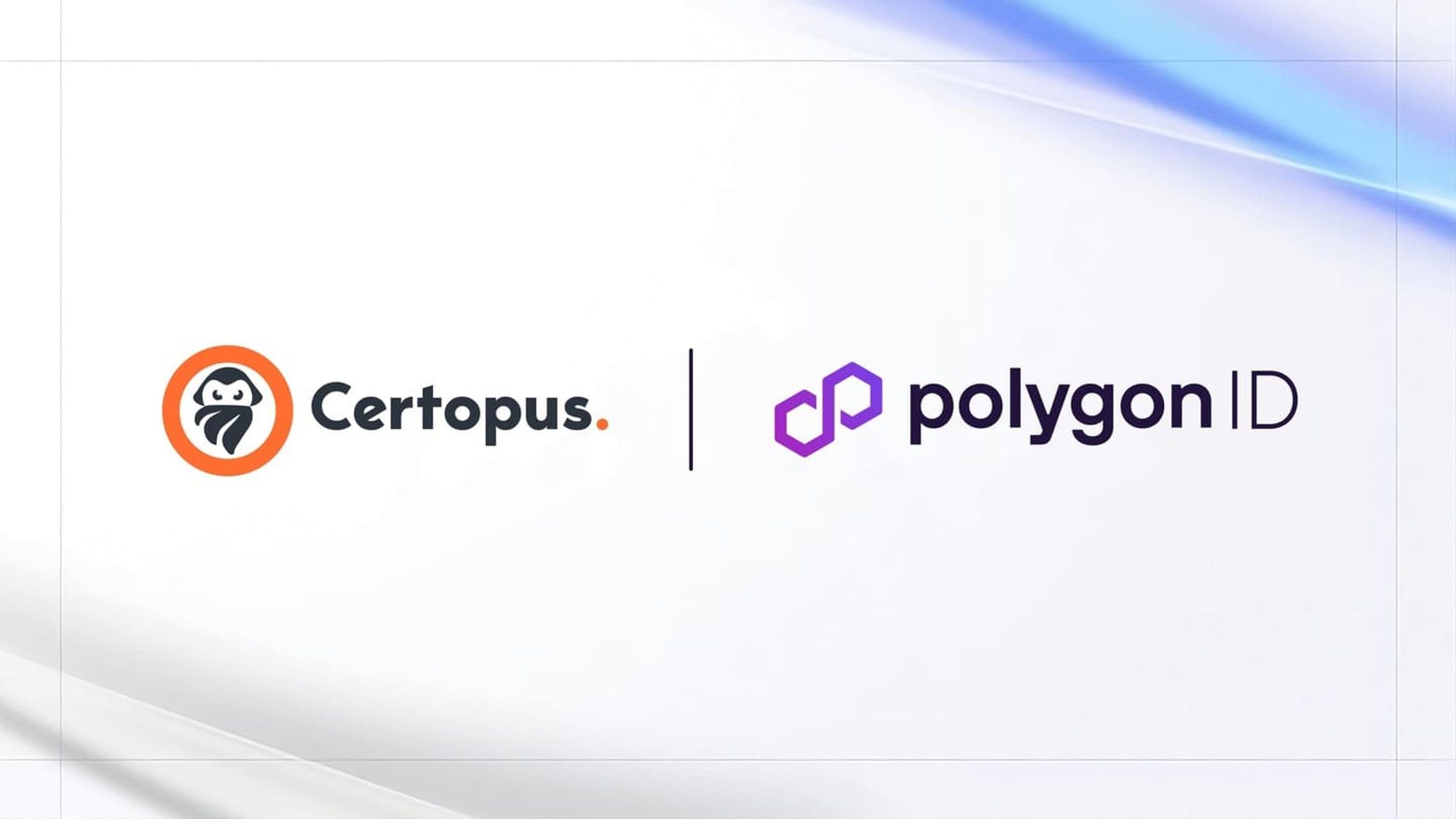Certopus + Polygon ID Collaboration

We are excited to announce a new collaboration between Certopus and Polygon ID to implement Web3 verifiable credentials standard for digital certificates and badges. This integration will allow Certopus to leverage Polygon ID's decentralized identity and credentialing infrastructure to provide trusted digital credentials that are verifiable, portable, and privacy-preserving. By building on open standards like W3C Verifiable Credentials and Decentralized Identifiers (DIDs), we can create a more seamless system for issuing, managing, and verifying credentials across different platforms. Our shared goal is not only to enhance trust in the digital ecosystem but also reduce the risk of credential fraud, making it easier for organizations to confidently engage with individuals in various online interactions, from job interviews to educational admissions.
Official statement from Polygon ID
“In a significant update, Certopus has transitioned from issuing Educational Certificates as NFTs to now delivering them as Verifiable Credentials, aligning with globally recognized standards. This strategic shift firmly establishes Certopus as a leader in serving its enterprise clients. We are delighted to stand by them on this path, leveraging our PolygonID's DID toolset. We eagerly anticipate collaborating closely with Certopus to drive the adoption of Educational certificates as privacy-preserving Verifiable Credentials within the enterprise sector.” Silvia Aran, Technical Sales Director, Polygon ID
Official statement from Certopus
“We are immensely excited to share the incredible news of our collaboration with Polygon ID, a move that will transform the landscape of digital credentials. By embracing the W3C Verifiable Credentials standard, we're set to offer people the power of secure and universally recognized digital credentials, putting trust and authenticity at the forefront. With the magic of verifiable credentials, we're taking a giant step towards a world where your digital identity and achievements are secure and under your control. Certopus is proud to lead this charge into the next era of digital credentials.” Vraj Gohil, Founder, Certopus
How will it benefit Digital Credentials Ecosystem?

Polygon ID-powered Web3 digital credentials, including digital certificates and digital badges, offer several key advantages over traditional Web2 digital credentials.
The triangle of trust which is the soul of Polygon ID will benefits issuers and recipients of digital credentials in many ways. The concept of Decentralized Identity (DID), Zero knowledge proofs, selective disclosure will strengthen security and privacy of digital credentials.
Certopus provides platform for issuing verifiable credentials with simplified issuer decentralized identity setup, easy to use managed schemas and wallet for recipients to manage their decentralized identity and claim credentials. Verifier is currently under development.
There are several benefits which we will explain it with a real life scenario:
Scenario: Imagine a scenario where a person, Alice, is applying for a job, and the employer requires her to provide verified university transcripts as part of the application process. In this context, Alice has the option to use either a Decentralized Identifier (DID) or email-based identity for her digital credentials wallet.
- Privacy and Security: →DID: Alice chooses to use a DID to store her academic credentials. The DID ensures her privacy because it doesn't expose her email address or other personal information. It only provides the necessary academic credentials for verification, reducing the risk of identity theft. →Email-Based Identity: If she were to use an email-based identity, she might need to share her email address to receive and send her transcripts, potentially exposing her to phishing attacks and unwanted emails.
- User Control: →DID: With a DID, Alice has full control over her academic credentials. She decides who can access and verify her transcripts, ensuring that she only shares her information with the potential employer. →Email-Based Identity: In an email-based system, she would typically send her transcripts as email attachments to the employer. This method provides less control over who accesses her credentials, potentially leading to privacy concerns.
- Trust and Decentralization: →DID: Using a DID for her credentials means they are cryptographically secured and can be independently verified without relying on a central authority or intermediary. The employer can trust the credentials without relying on a single, centralized source. →Email-Based Identity: Sharing academic credentials via email relies on the trustworthiness of the email provider and end user systems introducing a level of centralization and vulnerability.
- Interoperability: →DID: DIDs are designed to be interoperable across different verification systems and applications, making it easy for Alice to use her academic credentials with various employers, universities, and credential verification services. →Email-Based Identity: Email-based credentials may not be as easily integrated with different verification systems, potentially causing friction when applying to different organizations.
- Self-sovereign Identity: →DID: Using a DID aligns with the concept of self-sovereign identity, where Alice has full control over her academic credentials and doesn't need to rely on intermediaries for verification. →Email-Based Identity: Relying on email service providers means she has less control over her academic credentials and may have to depend on them for verification.
- Selective Disclosure: →DID: Using a DID, Alice can employ selective disclosure. This means she can provide the employer with a verifiable proof of her academic credentials without revealing the entire set of her personal information. This enhances security and privacy. →Email-Based Identity: In contrast, email-based identity may lack the advanced selective disclosure capabilities provided by DIDs. When sending transcripts via email, it's challenging to disclose only specific details to the employer, potentially requiring the sharing of more personal information than necessary.
About Polygon ID

Polygon ID is a self-sovereign, decentralized and private identity platform for Web3. It allows users to control their own digital identities and personal data, and to prove their identity without revealing sensitive information. Polygon ID is powered by zero-knowledge cryptography, a technology that enables privacy and scalability for blockchain applications. Polygon ID is also compatible with existing standards and ecosystems, such as verifiable credentials and decentralized identifiers.
About Certopus

Certopus is a digital credentials platform that helps you create and manage certificates and badges, for your courses, programs, training, and communities. Certopus lets you design your credentials using a template engine, issue them in bulk, send them via email, and get valuable data insights from them. Certopus also ensures that your credentials are secure and verifiable. Certopus is trusted by over 1200 organizations at present and integrates with popular learning management systems and applications to make digital credentials issuance seamless.
Need More Information?
Schedule a demo to learn more about Certopus for your business use case, or if you have any questions, don't hesitate to contact us. We would be delighted to assist you. Finally, if you're on social media, follow us to remain informed about our latest developments and learn more about digital credentials like certificates, badges, and micro-credentials.
